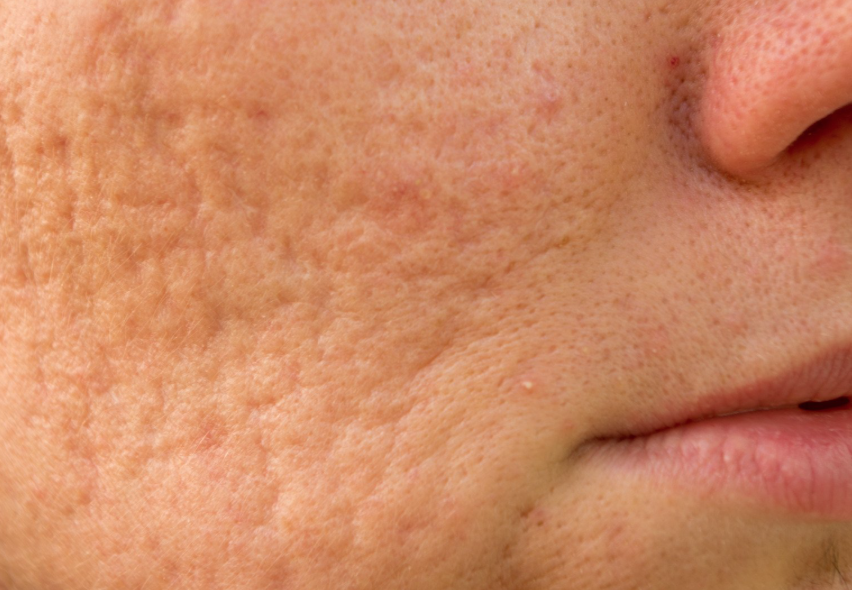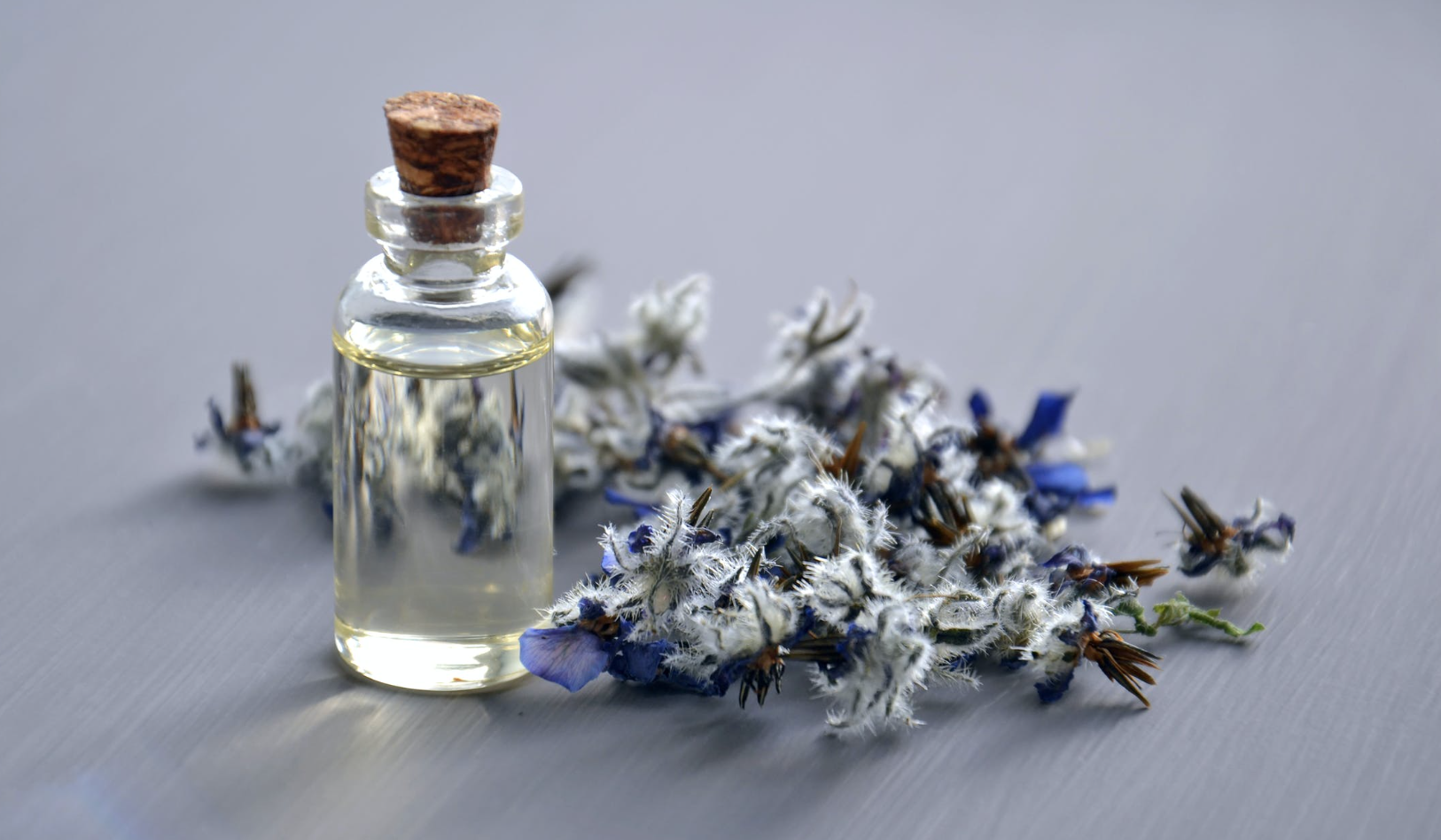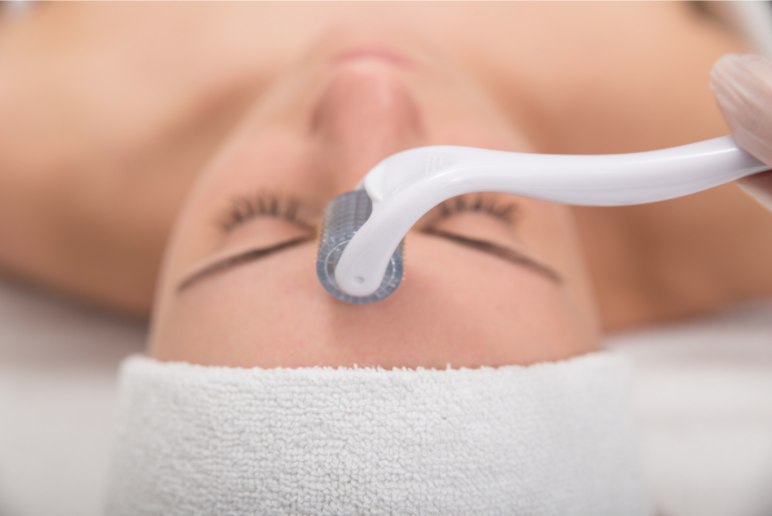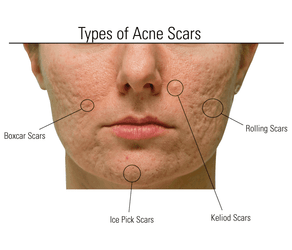Once the days of acne are over, sufferers look forward to waking up to peachy-perfect skin, however this isn’t always the reality they’re hit with. Acne can often leave its mark in the form of a scar.
Acne scars range in variety, making some easier to treat than others. But, it’s important not to rush into any treatment you can find without careful consideration. Some scar treatments are extremely abrasive to acne-worn skin and have the potential to create more problems or heighten skin sensitivity. Usually people aren’t left with just one type of scar either, so some conventional treatments may be suitable for certain kinds of scars and not others.
Identifying Acne Scars

Ice Pick Scars
Ice pick scars are characteristically thin/narrow and deep. Because of their depth, they’re perhaps the most difficult to treat and to disguise. Ice pick scars tend to be a result of severe, inflamed, cystic acne.
Ice pick scars, along with rolling and boxcar scars, fall under the ‘atrophic’ scar category which means they’re sunken in the skin, as opposed to being a raised scar (hypertrophic).
Rolling scars
Rolling scars appear as very shallow indentations on the skin and can make the surface of the skin appear uneven. They look like multiple scars, rolled into one uneven surface. They’re caused through underlying damage to the skin and a lack of collagen, which means as the skin ages, the appearance of them can worsen.
Boxcar scars
Boxcar scars are similar to rolling scars in that they are shallow indentations, however their edges are more defined and individual scars are easier to spot.
Keloid scars
Keloid scars fit under the ‘hypertrophic’ category - hypertrophic scars are raised, bumpy and mimic the acne that caused them (without the red, inflamed appearance). They are a result of the body trying to heal, but is caused by the proliferation of cells and collagen.
Hyperpigmentation
Although hyperpigmentation technically isn’t classed as a scar, it’s very much like them! Hyperpigmentation marks lie flat on the skin – they’re neither raised nor depressed. They look like a discoloured, pigmented mark on the skin, left behind due to an overproduction on melanin, which unfortunately tends to occur more frequently on non-Caucasian skin.
Sun exposure can worsen the appearance of hyperpigmentation, so regular use of a natural sunscreen is recommended
The Dangers of Conventional Acne Scar Treatment
We understand that acne scars are difficult to deal with and can take a toll on your self esteem, so opting for more invasive methods of treatment can be taken as a last resort. If you are opting for a more conventional treatment route, it’s important to be informed of all the potential risks, so be sure to always do your research.
Chemical peels
Chemical peels are a regularly touted option for those dealing with post-acne related scarring. Ironically, one of the potential side effects of chemical peels is…scarring! Along with a risk of infection, The Mayo Clinic reports that chemical peels can have a much more serious internal impact, with links to heart, liver and kidney damage.
Laser treatments
Laser resurfacing is also popular, with an ablative laser used to remove layers of the skin and a nonablative laser used to stimulate collagen growth.
A part from being an expensive route involving multiple treatments, both types come with risks that could leave you with the similar issues - scars, acne, redness and changes in skin colour.
Treat Acne Scarring Naturally
When there is an injury to the skin, particularly with inflammatory acne, our bodies can respond by directing collagen to the area, but when too little collagen is produced and underlying layers of the skin are damaged, it can leave the area depressed, creating atrophic scarring.
On the other hand, the body can also respond by producing too much collagen, which leaves you with a raised, hypertrophic scar.
Natural Skincare
One of the first things to do whether you’re still dealing with acne or post-acne scarring is to switch to completely natural skincare. Acne prone skin deserves some TLC and the application of synthetic skincare often contains chemicals that can cause further damage to the skin – such as skin-sensitising benzoyl peroxide.
Buying certified organic skincare forgoes the synthetic ingredients found in conventional skincare. And if you’re buying Odylique, the ingredients selected for our formulations are done so for their skin-nurturing properties. Our plant oils and medicinal herbs contain the maximum vitamins and other antioxidants that can be readily absorbed and utilised by the skin for its care and beauty. For acne prone, or sensitive skin, we recommend cleansing with our Lemon & Tea Tree Purifying Wash, Toning with our Balancing Citrus Super Tonic and moisturizing with our Timeless Rose Moisturizer.
Essential Oils
Essential oils can be utilised in so many ways and studies have revealed their powerful impact on the skin. Essential oils are very concentrated and most have to be applied along with a carrier oil (such as coconut oil), rather than neat on the skin. Mixing an essential oil with a carrier oil (usually no more than a few drops) helps even distribution and maximise absorbency.
Lavender essential oil is one of the few essential oils that can be applied directly to the skin (but in small quantities)! A study was carried out to test the efficacy of lavender oil’s wound healing capabilities and the results were promising – with the lavender inducing collagen production – exactly what is needed when it comes to atopic scarring!
Time
Most scars will improve with time, although depending on the severity of the scarring; the improvement may not be dramatic. For mild scarring and hyperpigmentation, however, time can allow your skin to heal and resurface completely, leaving you with gorgeous skin once again.
There are things you can do to speed up the healing process, though. Calendula has been found to promote skin regeneration and is ideal to use topically on acne scars. Rosehip oil is also a great addition to your skincare routine – it reduces inflammation and is rich in vitamin A, which can help improve the appearance of the skin. If you want to add rosehip to your skincare routine, try out Superfruit Concentrate, our long-lasting, nutrient-rich skin saviour!

Dermaroller
Using a dermaroller (or micro-needling) can one method of treating atrophic scarring (such as ice pick scars). The idea behind it is to create small punctures in the skin to stimulate collagen production as the skin heals, which can help improve the appearance of and “fill in” the scarred skin.
Dermarolling can be carried out through a professional, or done at home – but there are precautions to take if you decide to do this yourself and the practice should never be undertaken when you still have active breakouts.
Prevention
If you’re enduring acne at the moment and want to minimise the risk of being left with scars, the following guidelines should help:
1. Healthy Diet
Eating a diet filled with fruits and vegetables is of course recommended and cutting out possible acne aggravators (many report dairy to be an issue) should also help.
But there are foods you can consume that could help prevent acne lesions resulting in scarring. For example, curcumin, which is a component of turmeric, has been shown to reduce wound-healing time. Avocados have also demonstrated their ability to increase collagen production, which is necessary in the healing of atrophic scars.
2. Don’t pick!
We know, it’s hard to resist, but picking at your skin can cause further damage – think bacteria (meaning more spots) and prohibiting healing (scarring). The only time to squeeze a spot is if you have clean hands and the blemish has a white top (a whitehead)…but after that use a natural spot treatment and leave it alone.
3. Gentle skincare
What we put on our skin is very important, and if you have acne prone skin you probably already realise this. Many of us have tried an ineffective cosmetic product and been left with another breakout! Just as we explained above that natural skincare is important for scarred skin, natural acne treatments can be just as, if not more effective than conventional options, without disrupting the pH balance or causing other problems to overcome.
If you'd like any more advice on acne or scarring, please do email us at info@odylique.co.uk or add your question as a comment below – we're here to help!

